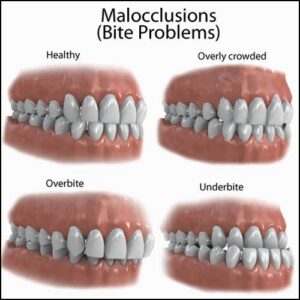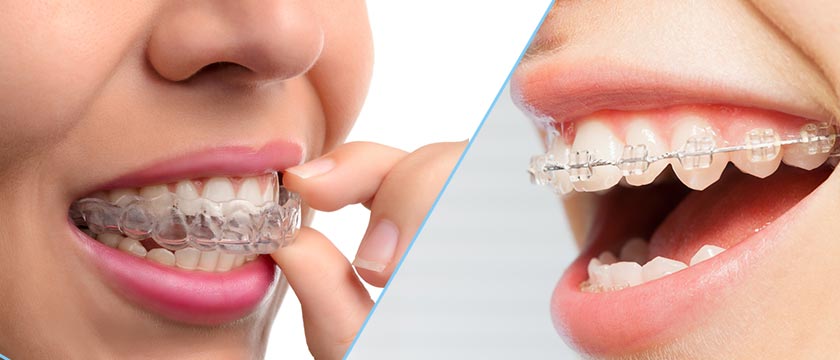Having a properly aligned bite allows your teeth to function optimally and prevents an array of potential dental problems. A proper bite is when your upper teeth fit just slightly over your bottom teeth, the grooves of your upper molars fit with the bottom and the middle of the upper and lower teeth should line up in a straight line.
Unfortunately, relatively few people are born with a perfect bite, with over 75% of the world’s population estimated to have either an overbite, underbite, or crossbite – conditions collectively known as malocclusion. While most misaligned bites are inherited, physical defects (such as a cleft palate), tooth loss, and certain detrimental childhood habits, including thumb sucking and excessive bottle or pacifier use, can also result in a bad bite.

Despite how common malocclusion is, many people remain unaware of the problems it can cause. In addition to being a cosmetic concern, a poorly aligned bite can damage your teeth and lead to jaw pain, headaches, and other issues. Undergoing bite correction improves your oral health resulting in better physical health as well. If you have any concerns regarding your uneven bite, consulting with an orthodontal specialist could provide you with the best bite correction treatment option(s).
What Problems Can an Uneven Bite Cause?
Excessive Tooth Wear
When a person’s teeth are aligned properly, the force of their bite is distributed evenly across them. In cases of malocclusion or crooked teeth, however, certain teeth absorb more force than others, which can lead to excessive tooth wear, hairline cracks, and even chipped or broken teeth. Worn down teeth can lead to a weaker, more sensitive tooth which can result in tooth pain while eating or drinking, but more seriously makes the teeth more prone to decay and periodontal diseases. Uneven tooth wear can also cause malocclusion to get worse over time by further shifting the position of the teeth and jaw.
TMJ Pain and Inflammation
One of the most debilitating consequences of malocclusion is TMJ dysfunction (also known as a temporomandibular disorder or TMD). The temporomandibular joints are jaw joints located on each side of the head that connect the upper and lower jaw. When a person has an improper bite, it strains the muscles and ligaments surrounding the TMJ, leading to chronic stiffness, soreness, and headaches. In some cases, people with TMJ dysfunction also clench or grind their teeth overnight, which worsens the pain of TMD and excessive tooth wear.
Some signs that you may have TMD include chronic jaw tension and soreness (which may also be felt in the temples or radiate down the neck and shoulders), a clicking or popping sound when you open your mouth or chew, recurring headaches, and tooth sensitivity.
Impaired Functionality
When the teeth don’t fit together properly, biting and chewing are often impaired. If you have malocclusion, you may notice that it’s difficult to eat hard or chewy foods, or that your jaw feels tense, sore, or tired after eating. While these symptoms may seem minor, inadequate chewing can contribute to multiple digestive problems, including excess gas and bloating, heartburn, and stomach ache. Some evidence suggests that failing to chew food thoroughly can even reduce nutrient absorption.
Speech impediments can also be a result of poor bite alignment, particularly in severe cases. Teeth play a crucial role in pronunciation, so uneven spacing often negatively impacts speech clarity. Lisps, for example, often arise from malocclusion.
A Higher Risk of Cavities & Gum Disease
Issues associated with an uneven bite, such as overcrowding and gaps between teeth frequently contribute to tooth decay, gingivitis, and periodontitis (gum disease). If your teeth are not aligned properly, you may find it difficult to keep your teeth clean — harder to floss between certain teeth or having food particles get stuck in hard-to-reach areas. Over time, the dental hygiene challenges associated with malocclusion cause plaque and bacteria to build up between the teeth and below the gum line, resulting in cavities and gum disease. Left untreated, gum disease can cause the gums to pull away from the teeth (gum recession), removing critical support. Currently, gum disease is one of the leading causes of tooth loss in older adults.
Reduced Confidence & Self-Esteem
Having a pronounced overbite or underbite can make you feel self-conscious and anxious about your appearance, making it harder to enjoy social situations. Not only will correcting malocclusion improve your confidence and quality of life, but it may also change your face in ways you didn’t anticipate: Many people who undergo orthodontic treatment are pleasantly surprised to discover that having a more even, healthy bite makes their jawline more symmetrical and defined, improving the contours of their face.
Bite Correction Treatments

Many people delay correcting their bite because they don’t want braces, but braces aren’t the only way to treat malocclusion. At our Mississauga orthodontics clinic, we offer a wide range of bite correction treatment options, including retainers, brackets, and clear aligners. Clear aligners are invisible and don’t affect which foods you can eat, allowing you to straighten misaligned teeth with minimal inconvenience.
For those with genetic deformities or jaw abnormalities resulting from trauma, surgery may be required to properly align the teeth. As an experienced oral surgeon, Dr. Oscar Dalmao can advise you on orthodontic care and the best bite correction treatment to bring your teeth into their proper position. You can view a full list of orthodontic and other services that our Mississauga dental clinic provides here.
Visit Dr. Oscar Dalmao Today to Discuss Dental Alignment
Whether you want to straighten your teeth for cosmetic reasons or to treat TMJ pain, our caring team of dental experts can help. Contact Dr. Oscar Dalmao today for a no-obligation consultation where you can learn more about our orthodontic treatments.


